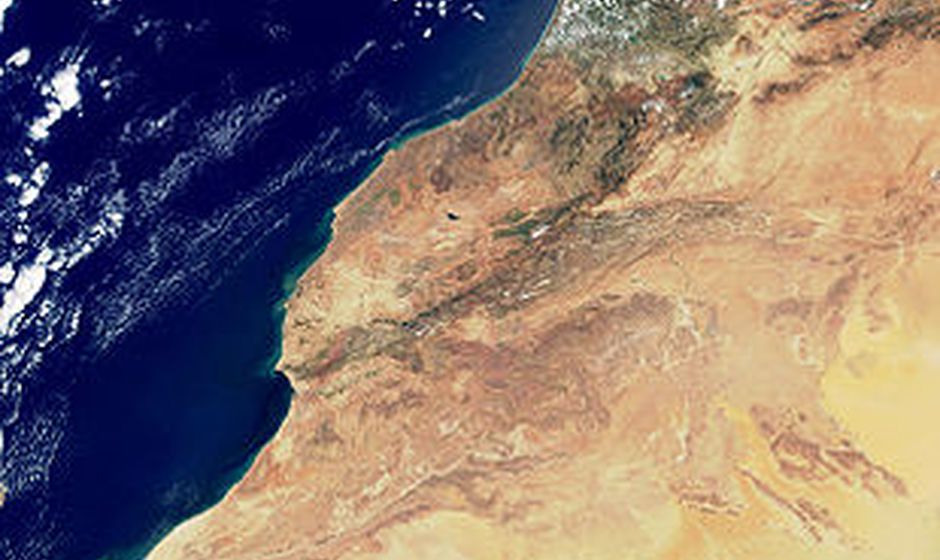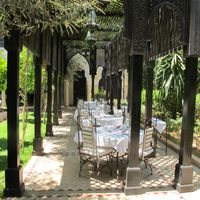A fascinating country. Here we cover some of the basics.

The geography of Morocco spans from the Atlantic Ocean, to mountainous areas, to the Sahara (desert). Morocco is a Northern African country, bordering the North Atlantic Ocean and the Mediterranean Sea.
A large part of Morocco is mountainous. The Atlas Mountains are located mainly in the center and the south of the country. The Rif Mountains are located in the north of the country. Both ranges are mainly inhabited by the Berber people.
Map references: Africa
Area:
total: 446,550 km²
land: 446,550 km²
water: 250 km²
Area - comparative: slightly larger than California
Land boundaries:
total: 2 017.9 km
border countries: Algeria 1 559 km, Mauritania 1561 km, Spain (Ceuta) 6.3 km, Spain (Melilla) 9.6 km
Physical geography
Mediterranean, becoming more extreme in the interior
Terrain: northern coast and interior are mountainous with large areas of bordering plateaus, intermontane valleys, and rich coastal plains
Geography - note: strategic location along Strait of Gibraltar
Elevation extremes:
lowest point: Sebkha Tah -55 m
highest point: Jbel Toubkal 4165 m
Land use and natural resources
Natural resources: phosphates, iron ore, manganese, lead, zinc, fish, salt
Land use:
arable land: 21%
permanent crops: 1%
permanent pastures: 47%
forests and woodland: 20%
other: 11% (1993 est.)
Irrigated land: 12 580 km² (1993 est.)
Natural hazards: northern mountains geologically unstable and subject to small earthquakes; periodic droughts
Morocco's economy is considered a relatively liberal economy governed by the law of supply and demand. Since 1993, the country has followed a policy of privatisation of certain economic sectors which used to be in the hands of the government. Morocco has become a major player in the African economic affairs, and is the 5th African economy by GDP (PPP). The World Economic Forum placed Morocco as the 2nd most competitive economy in North Africa behind Tunisia, in its African Competitiveness Report 2009. Additionally, Morocco was ranked the 1st African country by the Economist Intelligence Unit' quality-of-life index, ahead of South Africa.
Tough government reforms and steady yearly growth in the region of 4-5% from 2000 to 2007, including 4.9% year-on-year growth in 2003-2007 the Moroccan economy is much more robust than just a few years ago. Economic growth is far more diversified, with new service and industrial poles, like Casablanca and Tangier, developing. The agriculture sector is being rehabilitated, which in combination with good rainfalls led to a growth of over 20% in 2009.
The services sector accounts for just over half of GDP and industry, made up of mining, construction and manufacturing, is an additional quarter. The sectors who recorded the highest growth are the tourism, telecoms and textile sectors. Morocco, however, still depends to an inordinate degree on agriculture. The sector accounts for only around 14% of GDP but employs 40-45% of the Moroccan population. With a semi-arid climate, it is difficult to assure good rainfall and Morocco’s GDP varies depending on the weather. Fiscal prudence has allowed for consolidation, with both the budget deficit and debt falling as a percentage of GDP.
In 2009 Morocco was ranked among the top thirty countries in the offshoring sector. Morocco opened its doors to offshoring in July 2006, as one component of the development initiative Plan Emergence, and has so far attracted roughly half of the French-speaking call centres that have gone offshore so far and a number of the Spanish ones. According to experts, multinational companies are attracted by Morocco's geographical and cultural proximity to Europe, in addition to its time zone. In 2007 the country had about 200 call centres, including 30 of significant size, that employ a total of over 18,000 people.
The economic system of the country presents several facets. It is characterized by a large opening towards the outside world. France remains the primary trade partner (supplier and customer) of Morocco. France is also the primary creditor and foreign investor in Morocco. In the Arab world, Morocco has the second-largest non-oil GDP, behind Egypt, as of 2005.
Since the early 1980s, the Moroccan government has pursued an economic program toward accelerating real economy growth with the support of the International Monetary Fund, the World Bank, and the Paris Club of creditors. The country's currency, the dirham, is now fully convertible for current account transactions; reforms of the financial sector have been implemented; and state enterprises are being privatized.
The major resources of the Moroccan economy are agriculture, phosphates, and tourism. Sales of fish and seafood are important as well. Industryand mining contribute about one-third of the annual GDP. Morocco is the world's third-largest producer of phosphates (after the United States andChina), and the price fluctuations of phosphates on the international market greatly influence Morocco's economy. Tourism and workers' remittances have played a critical role since independence. The production of textiles and clothing is part of a growing manufacturing sector that accounted for approximately 34% of total exports in 2002, employing 40% of the industrial workforce. The government wishes to increase textile and clothing exports from $1.27 billion in 2001 to $3.29 billion in 2010.
The high cost of imports, especially of petroleum imports, is a major problem. Another chronic problem is unreliable rainfall, which produces droughtor sudden floods; in 1995, the country's worst drought in 30 years forced Morocco to import grain and adversely affected the economy. Another drought occurred in 1997, and one in 1999–2000. Reduced incomes due to drought caused GDP to fall by 7.6% in 1995, by 2.3% in 1997, and by 1.5% in 1999. During the years between drought, good rains brought bumper crops to market. Good rainfall in 2001 led to a 5% GDP growth rate. Morocco suffers both from unemployment (9.6% in 2008), and a large external debt estimated at around $20 billion, or half of GDP in 2002.
A reliable European ally in fighting terrorism, drug trafficking and illegal immigration, Morocco was granted an “advanced status” from the EU in 2008,shoring up bilateral trade relations with Europe. Among the various free trade agreements that Morocco has ratified with its principal economic partners, are The Euro-Mediterranean free trade area agreement with the European Union with the objective of integrating the European Free Trade Association at the horizons of 2012; the Agadir Agreement, signed with Egypt, Jordan, and Tunisia, within the framework of the installation of the Greater Arab Free Trade Area; the US-Morocco Free Trade Agreement with United States which came into force on January 1, 2006 and lately the agreement of free exchange with Turkey.
(text provided by Wikipedia)

Hard pushed to find fault.
Freelance travel journalist, Annabelle Thorpe, travelled to Fes with Lawrence of Morocco to research a piece for the Sunday Times Travel Magazine
We really know Morocco and have had the pleasure of making many people's dream trips become reality over the years. It has been our privilege to be asked to manage holidays, weddings and productions for so many fantastic and discerning clients. We remain small and dedicated to providing excellent honest advice to enable you to sit back, relax and enjoy the fun bits without having to manage the unpredictability of this fascinating country.
If you want it done right, look no further!